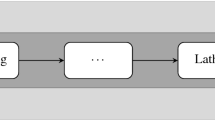Abstract
This paper addresses the problem of scheduling jobs in a flexible job shop with the objective of minimizing total tardiness. The flexible job shop differs from the classical job shop in that each of the operations associated with a job can be processed on any of a set of alternative machines. Two heuristics based on tabu search are developed for this problem: a hierarchical procedure and a multiple start procedure. The procedures use dispatching rules to obtain an initial solution and then search for improved solutions in neighborhoods generated by the critical paths of the jobs in a disjunctive graph representation. Diversification strategies are also implemented and tested. The outcomes of extensive computational results are reported.
Similar content being viewed by others
References
Aarts, E. H. L., Van Laarhoven, P. J. M., Lenstra, J. K. and Ulder, N. L. J. (1994) A computational study of local search algorithms for job shop scheduling. ORSA Journal on Computing, 6, 118–125.
Adams, J., Balas, E. and Zawack, D. (1988) The shifting bottleneck procedure for job shop scheduling. Management Science, 34, 391–401.
Anderson, E. J. and Nyirenda, J. C. (1990) Two new rules to minimize tardiness in a job shop. International Journal of Production Research, 28, 2277–2292.
Armentano, V. A. and Scrich, C. R. (2000) Tabu search for minimizing total tardiness in a job shop. International Journal of Production Economics, 63, 131–140.
Baker, K. R. (1984) Sequencing rules and due-date assignments in a job shop. Management Science, 30, 1093–1104.
Baker, K. R. and Kanet, J. J. (1983) Job shop scheduling with modified due dates. Journal of Operations Management, 4, 11–22.
Balas, E. (1969) Machine sequencing via disjunctive graphs: An implicit enumeration algorithm. Operations Research, 17, 941–957.
Barnes, J. W. and Chambers, J. B. (1995) Solving the job shop scheduling problem with tabu search. IIE Transactions, 27, 257–263.
Brandimarte, P. (1993) Routing and scheduling in a flexible job shop by tabu search. Annals of Operations Research, 41, 157–183.
Chakrapani, J. and Skorin-Kapov, J. (1993) Massively parallel tabu search for the quadratic assignment problem. Annals of Operations Research, 41, 327–341.
Chang, Y. and Sullivan, R. S. (1990) Schedule generation in a dynamic job shop. International Journal of Production Research, 28, 65–74.
Chang, Y., Matsuo, H. and Sullivan, R. S. (1989) A bottleneck-based beam search for job scheduling in a flexible manufacturing system. International Journal of Production Research, 27, 1949–1961.
Dauzère-Pérès, S. and Paulli, J. (1997) An integrated approach for modeling and solving the general multi-processor job-shop scheduling problem using tabu search. Annals of Operations Research, 70, 281–306.
Dell'Amico, M. and Trubian, M. (1993) Applying tabu search to the job-shop scheduling problem. Annals of Operations Research, 41, 231–252.
Du, J. and Leung, J. Y.-T. (1990) Minimizing total tardiness on one machine is NP-hard. Mathematics of Operations Research, 15, 483–495.
Fleurent, C. and Glover, F. (1999) Improved constructive multistart strategies for the quadratic assignment problem using adaptive memory, INFORMS Journal on Computing, 11, 198–204.
Glover, F. (2000) Multi-start and strategic oscillation methods principles to exploit adaptive memory, in Laguna, M. and Velaverde, J. L. G. (eds) Computing Tools for Modeling, Optimization and Simulation, Kluwer Publishers, Boston.
Glover, F. and Laguna, M. (1997) Tabu Search, Kluwer Publishers, Boston.
He, Z., Yang, T. and Deal, D. E. (1993) A multiple-pass heuristic rule for job shop scheduling with due dates. International Journal of Production Research, 31, 2677–2692.
Hoitomt, D. J., Luh, P. B. and Pattipati, K. R. (1993) A practical approach to job-shop scheduling problems. IEEE Transactions on Robotics and Automation, 9, 1–13.
Hurink, J., Jurisch, B. and Thole, M. (1994) Tabu search for the job-shop scheduling problem with multi-purpose machines. OR Spektrum, 15, 205–215.
Hutchison, J., Leong, K., Snyder, D. and Ward, P. (1991) Scheduling approaches for random job shops flexible manufacturing systems. International Journal of Production Research, 29, 1053–1067.
Kelly, J. P., Laguna, M. and Glover, F. (1994) A study of diversification strategies for the quadratic assignment problem. Computers and Operations Research, 21, 885–893.
Lawler, E. L., Lenstra, J. K., Rinnooy Kan, A. H. G. and Shmoys, D. B. (1993) Sequencing and scheduling: Algorithms and complexity, in S. C. Graves, A. H. G. Rinnoy Kan and P. H. Zipkin (eds) Logistics of Production and Inventory, North Holland.
Logendran, R. and Sonthinen, A. (1997) A tabu search-based approach for scheduling job-shop type flexible manufacturing systems. Journal of the Operational Research Society, 48, 264–277.
Montazeri, M. and Van Wassenhove, L. N. (1990) Analysis of scheduling rules for an FMS. International Journal of Production Research, 28, 785–802.
Nowicki, E. and Smutnicki, C. (1996) A fast taboo search algorithm for the job shop problem. Management Science, 42, 797–813.
Paulli, J. (1995) A hierarchical approach for the FMS scheduling problem. European Journal of Operational Research, 86, 32–42.
Stecke, K. (1983) Formulation and solution of nonlinear integer production planning problems for flexible manufacturing systems. Management Science, 29, 273–288.
Taillard, E. D. (1994) Parallel taboo search techniques for the job shop scheduling problem. ORSA Journal on Computing, 6, 108–117.
Van Laarhoven, P. J. M., Aarts, E. H. L. and Lenstra, J. K. (1992) Job shop scheduling by simulated annealing. Operations Research, 40, 113–125.
Vepsalainen, A. P. J. and Morton, T. E. (1987) Priority rules for job shops with weighted tardiness costs. Management Science, 33, 1035–1047.
Author information
Authors and Affiliations
Corresponding author
Rights and permissions
About this article
Cite this article
Scrich, C.R., Armentano, V.A. & Laguna, M. Tardiness minimization in a flexible job shop: A tabu search approach. Journal of Intelligent Manufacturing 15, 103–115 (2004). https://doi.org/10.1023/B:JIMS.0000010078.30713.e9
Issue Date:
DOI: https://doi.org/10.1023/B:JIMS.0000010078.30713.e9




